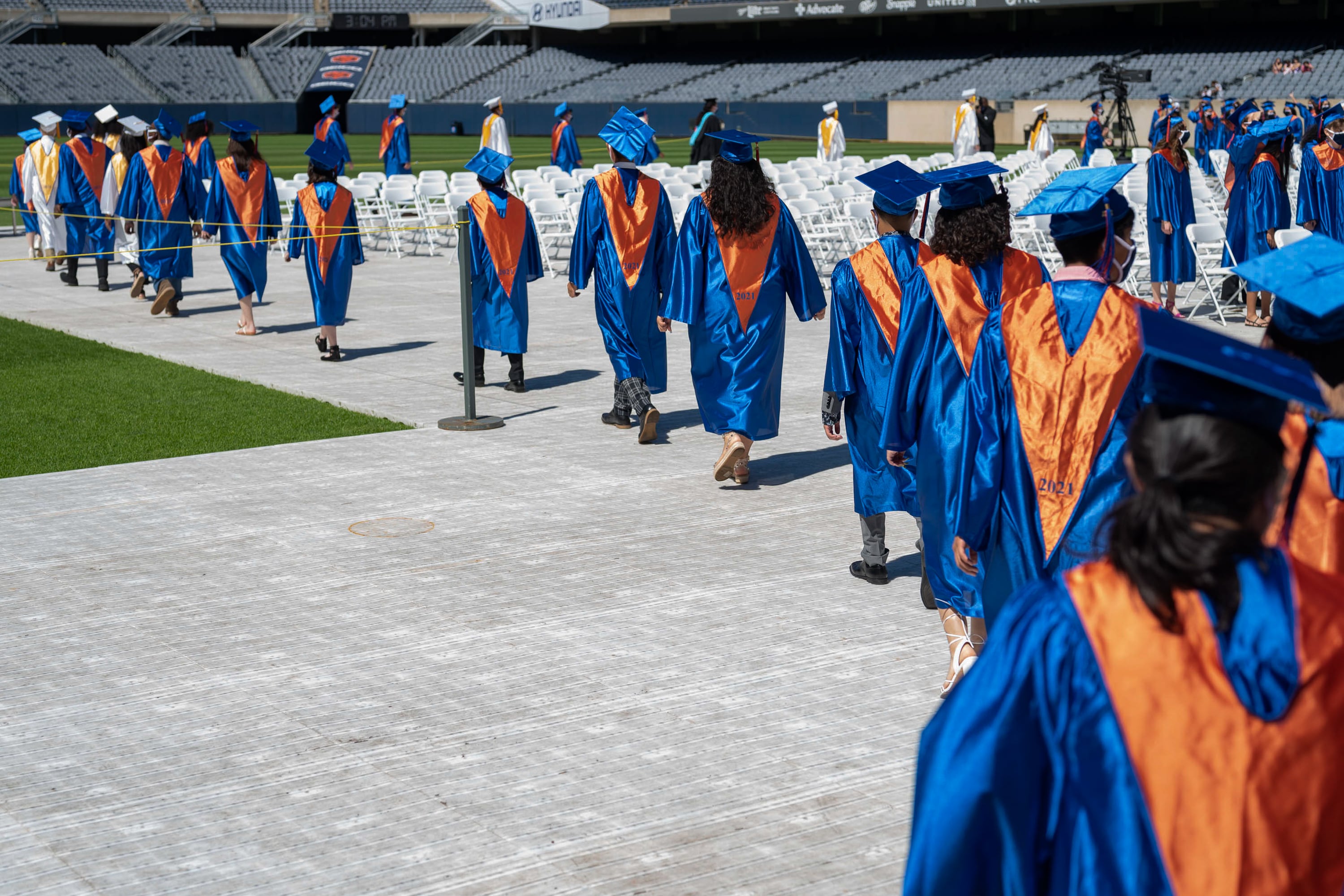A greater share of Chicago Public Schools students graduated last school year than in 2022, reaching a new record, officials announced Tuesday.
The graduation rate of 84% — representing students who graduated in four years — was 1.1 percentage points higher than the graduation rate for the Class of 2022, when 82.9% of high school students graduated on time. The dropout rate for the Class of 2023 was slightly higher at 9.4% than it was for the Class of 2022, which saw 8.9% of students drop out between freshman year and graduation.
Chicago Public Schools’ five-year graduation rate for the Class of 2022 — which includes students who take extra time to finish their diploma either at a traditional or alternative school — was 85.6%, 1.6 percentage points higher than for the class of 2021 when it was 84%.
District officials announced the numbers with fanfare at Walter H. Dyett High School for the Arts, with CPS CEO Pedro Martinez flanked by Mayor Brandon Johnson and joined virtually by U.S. Secretary of Education Miguel Cardona.
Martinez said the rising graduation rate was a sign that the district is continuing to recover from the pandemic, reminding the audience that the students in the Class of 2023 were freshmen as the pandemic started in 2020, followed by two school years of remote and hybrid learning.
“When you think about their last year, their senior year, was probably their most normal year, I want you to take these results and put them in that context,” Martinez said.
Cardona described the graduation rates as “promising signs for the future of education in Chicago.” He highlighted the district’s use of federal COVID relief dollars, which CPS has put toward several purposes, including covering teacher salaries and hiring more instructional staff.
The announcement came one day after Illinois state education officials released statewide data, including graduation rates that had also increased across Illinois. (The state and Chicago Public Schools calculate graduation rates differently, so Chalkbeat is unable to provide direct comparisons.)
Chicago’s graduation rate has steadily increased over time, hitting a record high in 2022 even as students have faced academic challenges connected to the pandemic. Tuesday’s announcement comes on the heels of another report that found a rising share of CPS students are enrolling in college.
Racial disparities among graduates still remain, though they are narrowing. Graduation rates increased for Black, Hispanic and Asian American students, while dropping slightly for white students — by .4 percentage points — compared to the Class of 2022. Rates also dropped for multiracial students by 5.7 percentage points.
Nearly 75% of Black boys graduated in four years, up from roughly 65% five years ago, according to district data.
Despite higher graduation rates, SAT scores dipped for the Class of 2023, to an average composite score of 914. The average score for the Class of 2022 was 927, according to district data. Separately, the district also saw slightly fewer ninth graders — 88.7% — who were on track to graduate by 2026. That’s compared to 88.8% of the class that’s one year older than them.
As the pandemic set in, the district relaxed some grading policies, as did other school systems across the nation — raising questions about how such policies may have contributed to CPS’s rising graduation rates. Martinez argued that an increase in students completing college-level credits was a sign students were held to a high standard. Just under half of the Class of 2023 earned early college credits, a 5% increase from 2022, according to the district.
One of those students is Zaid Orduño, who said at Tuesday’s press conference that he took college-level courses at Daley College during his time at Sarah E. Goode STEM Academy, through the district’s Early College Program. His classes at Daley included English, math, sociology, and psychology, and he ultimately earned an associate’s degree alongside his high school diploma.
Taking those classes, he said, inspired him to pass up his original plan of joining his family’s construction business and instead pursue a civil engineering degree at Illinois Tech, he said.

Dyett, located in the Bronzeville neighborhood on the South Side, saw its graduation rate tick up by more than 3 percentage points, to 86%. Johnson noted how far the school had come since he and other community members participated in a highly publicized hunger strike in 2015 to demand that Dyett, then shuttered, reopen. He also recognized fellow hunger striker Ald. Jeanette Taylor, who now represents the neighborhood nearby in City Council and serves as the chair of the Committee on Education and Child Development.
“A hunger striker can turn into a mayor and an alderman, and more importantly, a hunger strike can lead to the success that we are experiencing with our students right here at Dyett High School,” Johnson said.
He also used the moment to once again advocate for expanding the Sustainable Community Schools Initiative that Dyett and 19 other schools are a part of. The program partners schools with a nonprofit that provides wraparound services for students and families.
Reema Amin is a reporter covering Chicago Public Schools. Contact Reema at ramin@chalkbeat.org.





